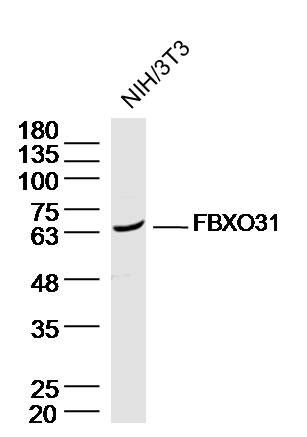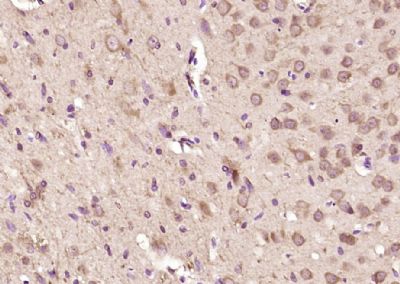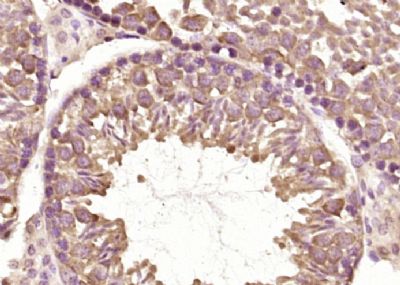FBXO31 Polyclonal Antibody
Purified Rabbit Polyclonal Antibody (Pab)
- SPECIFICATION
- CITATIONS
- PROTOCOLS
- BACKGROUND

Application
| WB, IHC-P, IHC-F, IF, E |
|---|---|
| Primary Accession | Q5XUX0 |
| Reactivity | Rat, Pig, Bovine |
| Host | Rabbit |
| Clonality | Polyclonal |
| Calculated MW | 61 KDa |
| Physical State | Liquid |
| Immunogen | KLH conjugated synthetic peptide derived from human FBXO31 |
| Epitope Specificity | 151-250/539 |
| Isotype | IgG |
| Purity | affinity purified by Protein A |
| Buffer | 0.01M TBS (pH7.4) with 1% BSA, 0.02% Proclin300 and 50% Glycerol. |
| SIMILARITY | Belongs to the FBXO31 family.Contains 1 F-box domain. |
| SUBUNIT | Part of a SCF (SKP1-cullin-F-box) protein ligase complex. |
| Post-translational modifications | Phosphorylation at Ser-278 by ATM following gamma-irradiation results in its stabilization. |
| Important Note | This product as supplied is intended for research use only, not for use in human, therapeutic or diagnostic applications. |
| Background Descriptions | FBXO31 belongs to the F-box protein family. Such proteins are characterized by an F-box motif of approximately 40 residues. F-box proteins interact with SKP1 through the F box and they interact with ubiquitination targets through other protein interaction domains. There are two different isoforms. |
| Gene ID | 79791 |
|---|---|
| Other Names | F-box only protein 31, FBXO31, FBX14, FBX31 |
| Target/Specificity | Highly expressed in brain. Expressed at moderate levels in most tissues, except bone marrow. |
| Dilution | WB=1:500-2000,IHC-P=1:100-500,IHC-F=1:100-500,IF=1:100-500,ELISA=1:5000-10000 |
| Storage | Store at -20 ℃ for one year. Avoid repeated freeze/thaw cycles. When reconstituted in sterile pH 7.4 0.01M PBS or diluent of antibody the antibody is stable for at least two weeks at 2-4 ℃. |
| Name | FBXO31 {ECO:0000303|PubMed:15520277, ECO:0000312|HGNC:HGNC:16510} |
|---|---|
| Function | Substrate-recognition component of the SCF(FBXO31) protein ligase complex, which specifically mediates the ubiquitination of proteins amidated at their C-terminus in response to oxidative stress, leading to their degradation by the proteasome (PubMed:39880951). FBXO31 specifically recognizes and binds C-terminal peptides bearing an amide: C-terminal amidation in response to oxidative stress takes place following protein fragmentation (PubMed:39880951). The SCF(FBXO31) also plays a role in G1 arrest following DNA damage by mediating ubiquitination of phosphorylated cyclin-D1 (CCND1), promoting its degradation by the proteasome, resulting in G1 arrest (PubMed:19412162, PubMed:29279382). The SCF(FBXO31) complex is however not a major regulator of CCND1 stability during the G1/S transition (By similarity). In response to genotoxic stress, the SCF(FBXO31) complex directs ubiquitination and degradation of phosphorylated MDM2, thereby promoting p53/TP53-mediated DNA damage response (PubMed:26124108). SCF(FBXO31) complex is required for genomic integrity by catalyzing ubiquitination and degradation of cyclin-A (CCNA1 and/or CCNA2) during the G1 phase (PubMed:31413110). In response to genotoxic stress, the SCF(FBXO31) complex directs ubiquitination and degradation of phosphorylated FBXO46 and MAP2K6 (PubMed:24936062, PubMed:30171069). SCF(FBXO31) complex promotes ubiquitination and degradation of CDT1 during the G2 phase to prevent re-replication (PubMed:24828503). The SCF(FBXO31) complex also mediates ubiquitination and degradation of DUSP6, OGT and PARD6A (PubMed:23469015, PubMed:34686346, PubMed:39894887). |
| Cellular Location | Cytoplasm. Cytoplasm, cytoskeleton, microtubule organizing center, centrosome {ECO:0000250|UniProtKB:B2RYN2} |
| Tissue Location | Highly expressed in brain. Expressed at moderate levels in most tissues, except bone marrow |

Thousands of laboratories across the world have published research that depended on the performance of antibodies from Abcepta to advance their research. Check out links to articles that cite our products in major peer-reviewed journals, organized by research category.
info@abcepta.com, and receive a free "I Love Antibodies" mug.
Provided below are standard protocols that you may find useful for product applications.
If you have used an Abcepta product and would like to share how it has performed, please click on the "Submit Review" button and provide the requested information. Our staff will examine and post your review and contact you if needed.
If you have any additional inquiries please email technical services at tech@abcepta.com.













 Foundational characteristics of cancer include proliferation, angiogenesis, migration, evasion of apoptosis, and cellular immortality. Find key markers for these cellular processes and antibodies to detect them.
Foundational characteristics of cancer include proliferation, angiogenesis, migration, evasion of apoptosis, and cellular immortality. Find key markers for these cellular processes and antibodies to detect them. The SUMOplot™ Analysis Program predicts and scores sumoylation sites in your protein. SUMOylation is a post-translational modification involved in various cellular processes, such as nuclear-cytosolic transport, transcriptional regulation, apoptosis, protein stability, response to stress, and progression through the cell cycle.
The SUMOplot™ Analysis Program predicts and scores sumoylation sites in your protein. SUMOylation is a post-translational modification involved in various cellular processes, such as nuclear-cytosolic transport, transcriptional regulation, apoptosis, protein stability, response to stress, and progression through the cell cycle. The Autophagy Receptor Motif Plotter predicts and scores autophagy receptor binding sites in your protein. Identifying proteins connected to this pathway is critical to understanding the role of autophagy in physiological as well as pathological processes such as development, differentiation, neurodegenerative diseases, stress, infection, and cancer.
The Autophagy Receptor Motif Plotter predicts and scores autophagy receptor binding sites in your protein. Identifying proteins connected to this pathway is critical to understanding the role of autophagy in physiological as well as pathological processes such as development, differentiation, neurodegenerative diseases, stress, infection, and cancer.




